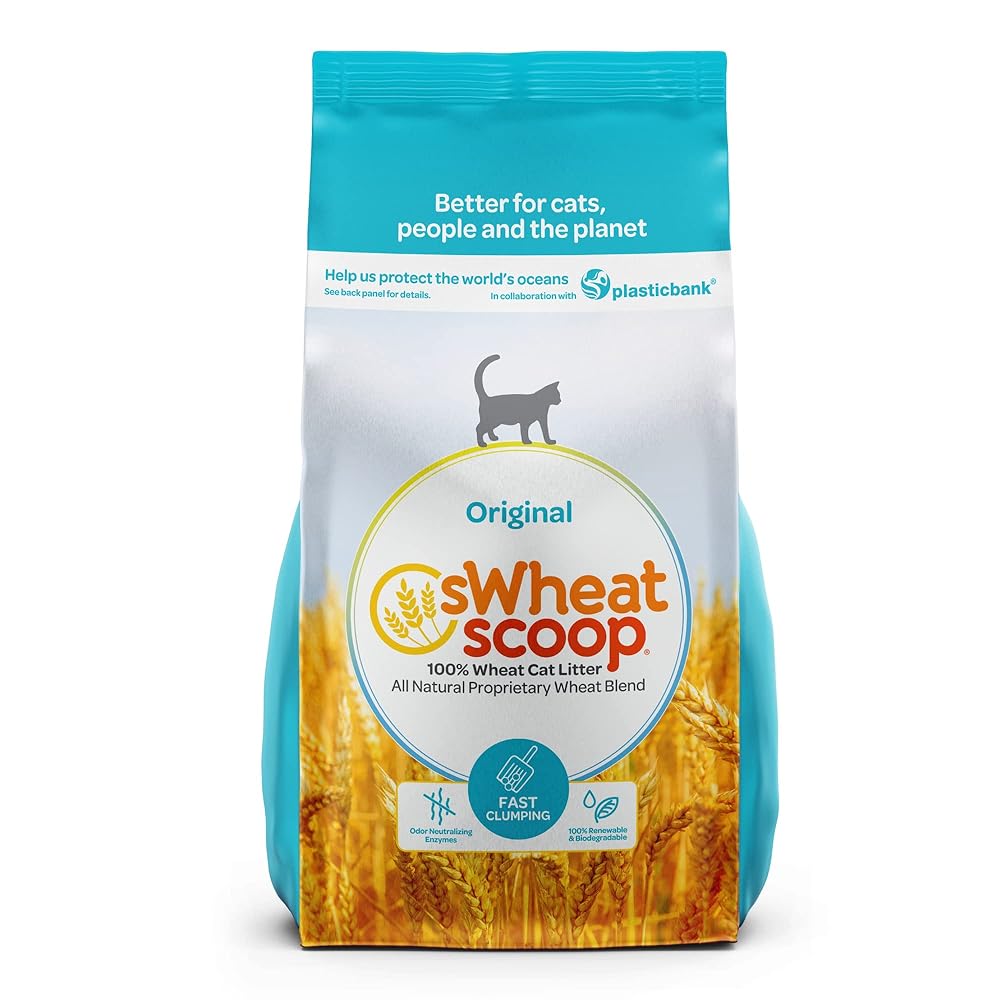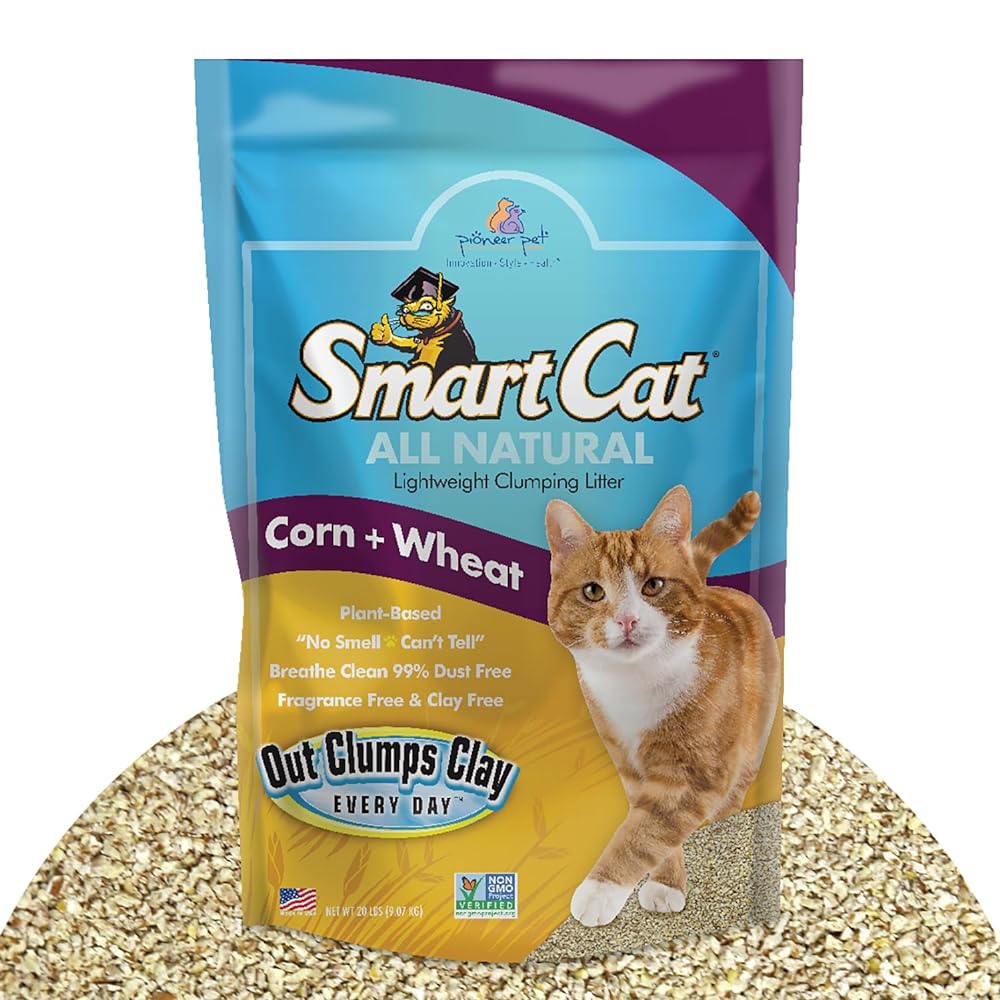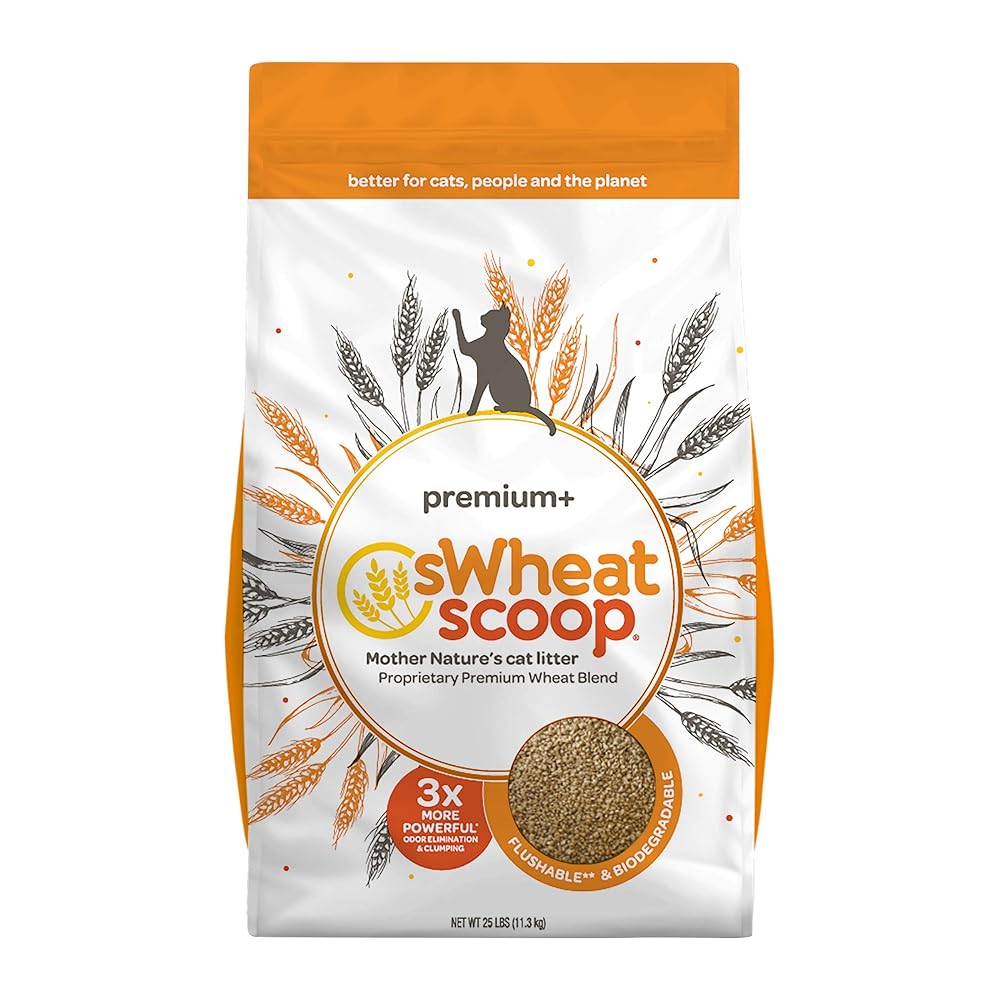iHeartCats is reader-supported. When you buy via links on our site, we may earn an affiliate commission at no extra cost to you.
As a specialist in cat health and nutrition, I understand that the choice of cat litter can significantly impact the overall well-being of your feline companion. In recent years, wheat cat litter has emerged as a viable, eco-friendly alternative to traditional clay litter. Known for its biodegradability, natural odor control, and effective clumping properties, wheat cat litter is increasingly being considered by pet owners who are environmentally conscious or have cats with specific health needs. This article aims to guide you through the best wheat cat litter on the market, discussing their advantages, limitations, and what to look for when making your selection.
#1 – sWheat Scoop Natural Wheat Multi-Cat Litter, Superior Clumping with Odor Neutralizing Enzymes, 25-Pound Bag
The sWheat Scoop Natural Wheat Multi-Cat Litter is a natural and effective cat litter that is designed for multi-cat households. It features superior clumping capabilities and odor-neutralizing enzymes that quickly eliminate unpleasant smells. Made from domestically sourced wheat, this litter is lightweight, 99.5% dust-free, and has low tracking. It is a sustainable and eco-friendly option that is safe for both cats and humans.
Best For: Best Overall
#2 – sWheat Scoop Natural Wheat Cat Litter, Original, Fast Clumping with Odor Neutralizing Enzymes, 25 Pound Bag
sWheat Scoop Natural Wheat Cat Litter is a clumping cat litter made from natural, domestically sourced wheat. It is designed to quickly and effectively trap odors on contact, making scooping and clean-up easy. This litter is 99.5% dust-free, low-tracking, and made without the use of added dyes, perfumes, or chemicals.
Best For: Those looking for a natural and environmentally-friendly cat litter option.
#3 – SmartCat All Natural Clumping Corn + Wheat Cat Litter, 20 Pound (320oz – 1 Pack) – Unscented and Clay Free
The SmartCat All Natural Clumping Corn + Wheat Cat Litter is a 99% dust-free and all-natural cat litter made from USA-grown wheat and corn. It easily clumps and locks away odors from multiple cats and is fragrance-free. The plant-based formula creates rock-hard clumps for easy cleaning and is designed to be soft and comforting for your cat’s paws.
Best For: Best Overall
#4 – sWheat Scoop Natural Wheat Cat Litter, Fresh Linen Scent, Powerful Odor Control and Low Tracking, 25-Pound Bag
The sWheat Scoop Natural Wheat Cat Litter is a cat litter made from natural, domestically sourced wheat. It offers powerful odor control and low tracking, thanks to its powerful natural starches and enzymes. The litter is also lightweight, 99.5% dust-free, and made without added dyes, perfumes, or chemicals.
Best for: Best ingredient sourcing
#5 – sWheat Scoop Multi-Cat All-Natural Clumping Cat Litter, 12.3lb Box
The sWheat Scoop Multi-Cat All-Natural Clumping Cat Litter is a 12.3lb box of cat litter that offers powerful, long-lasting odor control. It clumps fast for easy scooping and does not contain any added dyes or perfumes. Veterinarians recommend this litter, and it is 100% biodegradable, making it a great option for multiple-cat homes.
Best For: Multiple-cat homes on a budget.
#6 – sWheat Scoop Wheat-Based Natural Cat Litter, Premium+, 25-Pound Bag
The sWheat Scoop Wheat-Based Natural Cat Litter is a premium cat litter made from all-natural wheat-based materials. It is designed to help eliminate smelly urine and ammonia odors in single or multi-cat households. The litter is made from flushable and biodegradable wheat, free from harmful chemicals, dyes, and perfumes. It is an environmentally friendly alternative to traditional clay litters that are mined through strip mining processes.
Best for: Eco-conscious pet owners
What Should I Know About Purchasing Wheat-Based Cat Litter?
When considering the purchase of wheat-based cat litter, several key factors should be kept in mind to ensure that you are making an informed decision suitable for your cat and your household:
- Eco-Friendly: Wheat-based cat litter is biodegradable and often made from renewable resources, making them an environmentally friendly choice compared to traditional clay litter.
- Odor Control: Wheat naturally contains enzymes that help neutralize odors, making wheat-based litter generally effective for controlling smells. Some brands also incorporate additional odor-controlling ingredients like baking soda or plant extracts.
- Clumping Capability: Wheat litter is known for its ability to form solid clumps, making cleaning the litter box easier. However, the clumping strength can vary between brands, so you may need to experiment to find one that suits your preferences.
- Dust Level: Wheat-based litter typically produces less dust than clay-based litter. This can be advantageous for cats or humans with respiratory sensitivities, but the dust levels can still vary between brands.
- Cat Preferences: Cats can be finicky about the texture and smell of their litter. When transitioning to wheat-based litter, it’s advisable to mix it gradually with your current litter to allow your cat to adjust. Monitor for any signs of discomfort or litter box aversion.
- Allergies: If your cat or anyone in your household has a known wheat or grain allergy, consult your veterinarian before switching to a wheat-based litter.
- Cost: Wheat-based litters can be more expensive than traditional clay litter but are often competitively priced with other natural or eco-friendly alternatives. Always consider the long-term costs, especially if you have multiple cats.
- Availability: While wheat-based cat litter is becoming more common, they may not be as readily available as clay litter. You may need to purchase them from specialty pet stores or online.
By understanding these considerations, you can make an informed choice about whether wheat-based cat litter is the right option for you and your feline companion.
What Are The Pros and Cons of Wheat-Based Cat Litters?
Wheat-based cat litters offer a range of benefits but also come with some drawbacks. Here’s a breakdown of the pros and cons to consider when evaluating this type of litter:
Pros:
- Eco-Friendly: Wheat-based litters are biodegradable and often made from renewable or recycled wheat products. This makes them a more sustainable option compared to traditional clay-based litters.
- Natural Odor Control: Wheat contains enzymes that naturally help neutralize odors. Some wheat-based litters also incorporate other natural odor-controlling elements like baking soda or plant extracts.
- Effective Clumping: Wheat litters are known for forming solid, cohesive clumps, making it easier to clean the litter box. This can be particularly useful for households with multiple cats.
- Low Dust Production: Compared to traditional clay litters, wheat-based litters typically produce less dust, making them a better choice for people and cats with respiratory sensitivities.
- Chemical-Free: Wheat-based litters are usually free from harmful chemicals, artificial fragrances, and synthetic additives, making them a safer option for your cat.
Cons:
- Cost: Wheat-based litters are generally more expensive than traditional clay-based litters. If you’re on a tight budget, this could be a consideration.
- Allergen Concerns: If your cat or anyone in the household has a wheat or grain allergy, a wheat-based litter may not be suitable. Always consult your veterinarian if you’re unsure.
- Variable Quality: The quality of wheat-based litters can vary between brands, affecting factors like odor control and clumping ability. It may take some trial and error to find a brand that suits your needs.
- Potential for Mold: Because wheat is an organic material, there is a possibility of mold growth if the litter becomes very wet and isn’t cleaned regularly.
- Availability: While increasingly popular, wheat-based litters may not be as widely available as traditional clay or silica litters. You may need to shop at specialty stores or buy online.
Understanding these pros and cons will enable you to make an informed decision about whether wheat-based cat litter is the best choice for your feline friend’s needs and your household requirements.
Frequently Asked Questions About Wheat Cat Litters
1. Is wheat cat litter eco-friendly?
Yes, wheat-based cat litter is generally considered eco-friendly as it is biodegradable and often made from renewable wheat by-products. This makes it a more sustainable option compared to traditional clay litters, which usually require strip-mining for their production.
2. How effective is wheat cat litter at controlling odor?
Wheat cat litter usually offers good odor control due to the natural enzymes in wheat that help neutralize smells. Some brands also include additional odor-controlling ingredients like baking soda to enhance effectiveness.
3. Does wheat cat litter clump well?
Most wheat-based cat litter are known for their solid clumping properties. The strength and durability of these clumps can vary by brand, so you might need to try a few to find one that meets your requirements for easy scooping and cleaning.
4. Will wheat cat litter produce a lot of dust?
Wheat-based cat litter generally produces less dust than traditional clay-based litter. This can be particularly beneficial for cats or humans with respiratory issues or sensitivities to dust.
5. Is wheat cat litter expensive?
Wheat-based cat litter is often more expensive than conventional clay-based litter. However, they can be competitively priced when compared to other natural or eco-friendly litter options. Always consider the long-term costs, especially if you have multiple cats.
6. Is wheat cat litter suitable for cats with allergies?
Wheat cat litter is often considered hypoallergenic, but if your cat has a known allergy to wheat or grains, consult your veterinarian before making the switch. Always monitor your cat for any signs of allergic reactions when introducing a new type of litter.
7. How should I transition my cat to wheat cat litter?
It’s generally advisable to introduce new litter types gradually. Start by mixing a small amount of the wheat-based litter with your current type, and then increase the proportion over several days. This will help your cat adjust to the new texture and smell.
8. Can I compost wheat cat litter?
Wheat cat litter is biodegradable, but composting cat waste is generally not recommended due to the risk of pathogens and parasites. If you are considering composting, consult local guidelines and your veterinarian for proper methods and precautions.
9. Is wheat cat litter safe for kittens?
Wheat cat litter is generally safe for kittens, although you should always consult your veterinarian for advice tailored to your specific kitten’s age and health. Keep an eye on very young kittens to ensure they don’t try to eat the litter.
10. Where can I purchase wheat cat litter?
While wheat cat litter is growing in popularity, it may not be as widely available as traditional clay litter. You can often find it in specialty pet stores, health food stores, or through online retailers.
Conclusion: Best Wheat Cat Litters
Selecting the right cat litter involves a myriad of factors including environmental impact, effectiveness, and your cat’s own comfort and health. Wheat cat litter offers an excellent combination of sustainability, odor control, and clumping ability, making it a compelling choice for many pet owners. However, as with any product, it’s crucial to weigh its pros and cons carefully, taking into account your specific situation and your cat’s preferences or potential sensitivities. By doing so, you can make a well-informed decision that meets both your requirements and provides a healthy, comfortable environment for your feline friend.







